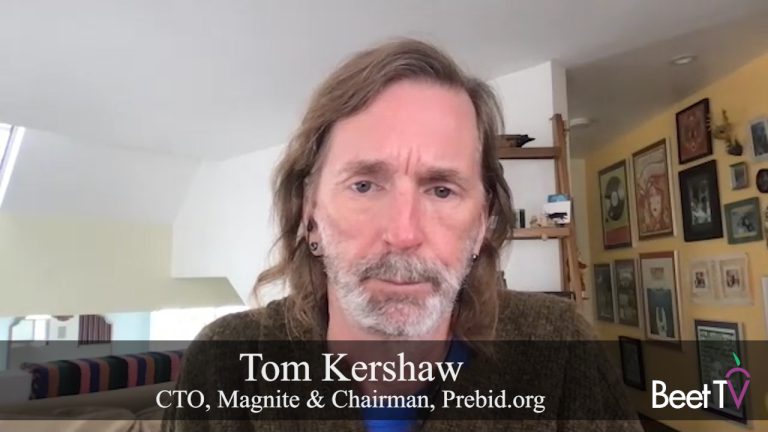
LOS ANGELES – The journey to the future of advertising identity is long and winding.
Amid the deprecation of third-party cookies and limits on other tactics like mobile identifiers, the industry is striving to develop new methods with which to identify audiences.
In doing so, perhaps it has become so used to reading about forthcoming limits and about targeting technology that is soon to be taken away, that some are jumping to conclusions, seeing deprecation everywhere they turn.
At least, that seems to be the suggestion of one ad-tech leader we interviewed this week.
Google sticks with email
In this video interview with Beet.TV, Tom Kershaw, the CTO of Magnite and chairman of Prebid.org, says a big announcement made last week was actually anything but.
A blog post from Google’s director of product management, ads privacy and trust David Temkin was interpreted as saying that e-mail-based people identifiers would not be used, going forward.
Google explicitly says that it will not build or use alternate identifiers and doubles down on Federated Learning of Cohorts (FLoC) as a way for advertisers to reach their audiences, by David Temkin via @Google>> https://t.co/8VYZPVWCaI pic.twitter.com/dS83LLd24w
— Amy Bishop (@Hoffman8) March 4, 2021
But Kershaw thinks that isn’t what Temkin said at all.
“Google’s announcement last week I think was blown out of proportion by a lot of analysts in our industry,” he says. “While it’s significant that Google’s Ads division is actually making statements about the future of identity, really it was limited to Google continuing to support the Privacy Sandbox effort and announcing they don’t plan on using email address identifiers on their platform.
“It does not mean that they’re banning them or going to war with them or in any way restricting them. It was simply a statement of Google’s intent to support Privacy Sandbox.”
All-in on login
In the mix, Kershaw sees a strong strategy in which publishers are trying to get users to voluntarily sign up to receive content and services.
Creating user logins would provide publishers with valuable, user-contributed profiles that speak the truth about user affinities and don’t necessarily rely on an arsenal of ad-tech to infer likes and dislikes. But Kershaw acknowledges this approach, like many others, will be only partial.
“I think there are going to be challenges in getting user logins past 15, 20%, so we need other mechanisms,” he says.
“And so most of our publishers are all-in with us using publisher data to create audience (on) the sell side and to expose those segments in a measurable way to buyers.”
Publisher first-party will be the most comprehensive solution to targeting users in a post-cookie world says our CTO Tom Kershaw. Read more at: https://t.co/y0jTnDaGPk https://t.co/xWNIk9r2uP
— Magnite (@magnite) March 4, 2021
Community approach needed
All of which means the future of identity will be comprised by multiple solutions.
Many are out there right now, competing for attention. But Kershsaw is concerned that some are coming from vested interests. He favors an open-source approach, which is why he chairs Prebid.org, the open-source header bidding solution.
“They’re owned by for-profit companies and doing it as part of their business,” Kershaw complains. “That has impeded adoption in some cases, because there’s some distrust and concern about data ownership and leakage.
“What we think is needed is an open-source identity, a solution that’s owned by the community that’s not in the hands of any one company, that gives buyers and sellers comfort that the idea is not just going to go away or have a price increase of 800,000,000% or anything like that. We need something that’s owned by the community.”
Kershaw says Prebid and The Trade Desk have agreed to use UID (Universal ID) operated by Prebid.org, giving “impartiality, trust and transparency”.